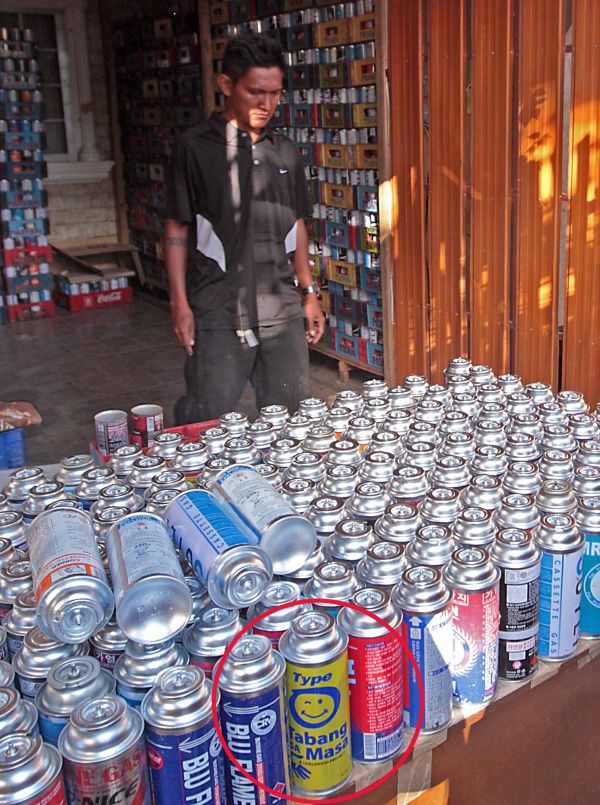CHEAP BUT RISKY
Why it’s dangerous to misuse butane canisters as LPG refills
First, a fresh wave of public warnings.
Next step, a “massive confiscation” of butane canisters that are refilled with cooking gas.
This action was agreed yesterday in a closed-door meeting where government agencies in Cebu formed an inter-agency task force to go after illegal refilling stations of Liquefied Petroleum Gas (LPG).

Stocks of butane canisters fill a home-based refilling station in Kinsang-an< Pardo, Cebu City where an explosion injured eight workers on Nov. 3. One can is labeled “Type O, Tabang sa Masa” as a campaign giveaway for former mayor Tomas Osmena, a brand he used in the 2013 elections.
Cebu City Councilor Dave Tumulak will lead the task force, said legal officer Mark Gamallo of the Department of Energy (DOE) 7.
The meeting followed a Nov. 3 explosion that injured eight workers in a home-based refilling station in barangay Kinasangan-Pardo in Cebu City.
The rampant sale of refilled butane canisters continues in neighborhoods across Cebu because of its cheap retail price as low as P20.
Contrary to earlier reports that no guidelines or penalties address this situation, a 2014 circular of the DOE metes a P60,000 administrative fine, closure and can lead to criminal charges for parties that engage in the LPG industry without a valid Standard Compliance Certificate (SCC).
Amor Pelenia had no business permit or SCC, but she had stocks of butane canisters in her two-storey house where workers were allegedly “washing and repainting” the tin cans when the explosion happened.
Gamallo said the task force will crack down on butane refiling stations after DOE finishes its investigation of the Nov. 3 accident.
The closed-door meeting was attended by representatives of the DOE, Department of Trade and Industries, Bureau of Fire Protection and Cebu City Disaster Risk Reduction Management Council.
LPG refilling stations are strictly regulated under the DOE circular issued Jan. 7, 2014 by then Energy Secretary Jerico Petilla.
Under Section 25 which defines “illegal refiling”, its prohibited to refill LPG into “single trip and/or tin canisters or cartridges not designed or intended for LPG.” A “backyard refilling station” that does not meet safety requirements of the DOE is subject for closure. This includes lack of an Standard Compliance Certificate issued by DOE, a business permit from the mayor, a certificate from the Bureau of Fire Protection, and an Environmental Compliance Certificate Issued buy the DENR.
Councilor Tumulak, who heads CCDRRMC said butane canisters should only be used once and can’t be refilled with LPG.
Its label must must contain the registered name of the manufacturer, its tracking number and its net weight aside from safety tips and instructions on how to dispose them properly.
Butane canisters sell for P60 to P70 each in supermarkets, depending on the brand, and are legal products.
These are intended for one-time use for camping and outdoor activities.
But enterprising retailers and backyard operators refill them with LPG and sell them for P20 or less, he said.
The small tin can holds enough LPG to cook six meals for three days , making it a cheap alternative to LPG where a a one-kilo tank would cost more than P700.
The agencies agreed yesterday to conduct a public information drive next week about the dangers of misusing butane canisters.
“The DOE will head the operation. We are just waiting for their order if they will order a massive confiscation of refilled butane canisters,” said Tumulak.
Related Stories: Eight injured in butane explosion inside home
No guidelines, no charges against butane outlet owner
Refilled butane canister bears ‘Type O’ campaign sticker
Disclaimer: The comments uploaded on this site do not necessarily represent or reflect the views of management and owner of Cebudailynews. We reserve the right to exclude comments that we deem to be inconsistent with our editorial standards.
